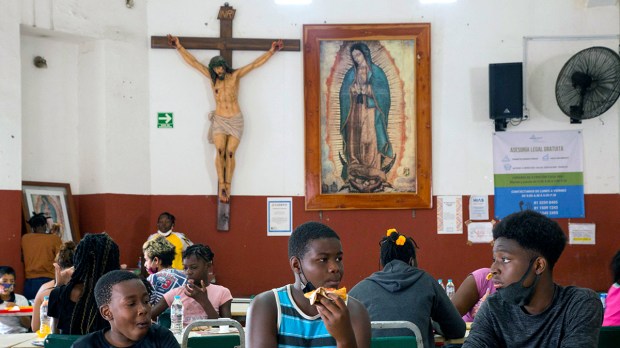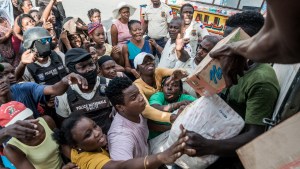It seems as if the only time we hear about Haiti in the news is when it is struck by misfortune, ranging from political assassination to natural disasters. Such reports are sadly frequent, and it’s no surprise that there are many Haitian migrants seeking refuge and hope in other countries. Although many set their sights on the USA, some are finding welcome and the opportunity for a new home in unexpected places along the way.
One of the locations where Haitian migrants are appearing is Monterrey, a city in northeastern Mexico less than 120 miles from the Texas border. It’s Mexico’s second largest metropolitan area, with more than five million inhabitants, who are accustomed to migrants coming to the city for work, to study at one of its universities, or as a stop on the way north to the USA. Haitians are the latest addition to this influx.
The Catholic archbishop of Monterrey, Rogelio Cabrera López, on September 22 visited Casa INDI, the largest Church-run shelter for the homeless and migrants in the archdiocese. The organization has been welcoming the numerous Haitians who have arrived in recent weeks, and the archbishop wanted to express the Church’s support and closeness. The shelter’s website reports his words: “In the name of the Church of Monterrey, I want to welcome you here with us. I want you to know that we respect you, I want you to know that you are important to us and that, in the midst of the problems you face (…), we want this to be an oasis for you.”
Casa INDI has already received more than 1,200 Haitians, according to a report in Expansión Política. One migrant, Gerson Telisma, told reporter Félix Córdova, “It’s like drinking a glass of water in the middle of the desert.” He relates how he traversed nine different Central American countries on the way, and now is considering staying in Monterrey.
Shelters including Casa INDI and Casanicolás (which is reportedly housing nearly 100 Haitians), both run by the Church, provide migrants with a place to stay and basic nutrition and health care, as well as spiritual support. While many plan to continue their journey, the social workers also offer them assistance if they choose to remain in Mexico.
Expansión Política reports that the state governor, Jaime Rodríguez Calderón, is asking the federal government to help regularize the migration status of the Haitians so they can find legal jobs in Mexico. The Department of Health of the State of Nuevo León has promised to ensure that proper measures are taken to avoid a COVID-19 outbreak among the migrants, something the shelters themselves are doing their best to carry out.
Further west, Tijuana (Baja California) has been welcoming Haitian immigrants for years now. Many have found jobs in assembly lines, and there’s now a “Little Haiti” 10 miles from Tijuana where migrants have formed a community. “We’ve hired dozens of Haitians and it’s been nothing but a great experience, how they’ve been able to integrate into society,” said Pedro Montejo, the president of an association of companies that deal in assembly and exportation, speaking to Televisa. A human resources representative of one of the companies involved explained to the Mexican news outlet that the company helps the immigrants who are prospective workers to obtain their visa and the other paperwork needed for them to be able to work legally in Mexico.
Back in Monterrey, the offices of the National Migration Institute have been overwhelmed by the number of requests and have yet to process all the petitions for legalized status, but the migrants have hope. One, named Marseille, told the Associated Press (quoted in the Los Angeles Times) that while her original goal was the USA, “It’s better if we stay in Monterrey. We want to work.” Archbishop Cabrera López has assured the temporary residents of Casa INDI that the Church will do what it can to support those who chose to stay. “It’s important that all of us in Mexico treat you as you deserve, as members of our society and also as part of humanity.”


